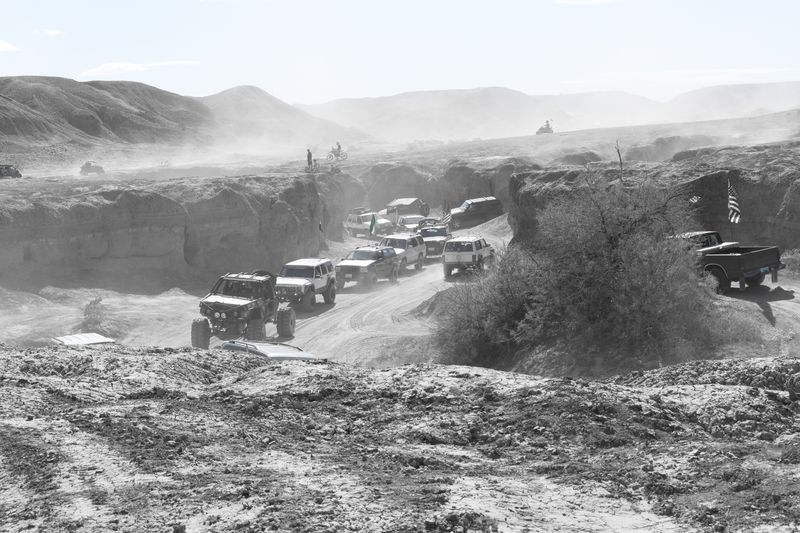Death Valley May Break Global Heat Record with 130-132 Degrees
A persistent and deadly heat wave is currently baking parts of the United States, with almost a third of the country experiencing extreme temperatures. Heat advisories, heat watches, and excessive heat warnings have been issued from the Mississippi River across the Southwest to the Pacific Ocean. The heat is not just hot; it is oppressive.
The Temperature in Death Valley
While the temperature index, which measures what it feels like outside, has reached between 103 and 125 degrees in various parts of the country, Death Valley, California holds the title for the hottest place on earth. This weekend, Death Valley is expected to set or tie a record, surpassing the previous mark of 129.4 degrees Fahrenheit set in 2021. Forecasters predict that the temperatures on Sunday may reach between 130 and 132 degrees in Death Valley.
A Texas-Sized Heat Wave
Texas is no stranger to extreme heat, and once again, the Lone Star State is sizzling under triple-digit air temperatures. With temperatures feeling like it’s almost 115 degrees, Texas may also set a new power usage record in the coming days.
The Heatwave in Phoenix
Phoenix, Arizona, is experiencing a prolonged period of extreme heat, with temperatures surpassing 110 degrees every day this month. The city may even break the record for the most consecutive days of extreme heat next week. While locals are finding relief by taking a plunge, officials are cautioning tourists against hiking in such extreme temperatures. The air temperature of 110 to 115 degrees could translate to scorching temperatures of 131 to 140 degrees on a trail. Unfortunate incidents, such as a recent hiking-related death in the Grand Canyon, highlight the dangers of extreme heat.
The Heat’s Toll
The consequences of extreme heat are not limited to land. Off the Florida Keys, there is a marine heat wave, with water temperatures soaring 10 degrees higher than normal, reaching 97 degrees. This rise in temperature is causing a shift in animal populations as they seek out more suitable conditions. Diver Jim Abernethy notes that “massive numbers of animals are moving from where they used to be to a different climate so that they can be in the temperature that they like.” The increased temperature could prove fatal for coral reefs, while beaches and lakes around the state contribute to making it one of the hottest years on record for Florida.
Editorial: A Call for Action
The current heat wave sweeping across the United States, particularly in Death Valley, Texas, and Arizona, is a stark reminder of the urgent need to address climate change. Such extreme temperatures can have devastating effects on both humans and the environment, from heat-related deaths to irreversible damage to ecosystems. It is a call for action that must be heeded by individuals, communities, and governments alike.
The Philosophy of Climate Change
Climate change is a complex issue that extends far beyond rising temperatures. It requires us to examine our relationship with the natural world and confront the consequences of our actions. From the burning of fossil fuels to deforestation, human activities have played a significant role in exacerbating climate change. The current heat wave serves as a reminder that we are not insulated from the effects of our actions, and it underscores the importance of considering the long-term consequences of our choices.
Individual and Collective Responsibility
While it may be easy to attribute extreme weather events solely to cosmic shifts, weather patterns point to the larger trends resulting from climate change. It is crucial for individuals to take responsibility for their individual carbon footprint, whether through reducing energy consumption, supporting sustainable practices, or engaging in advocacy for climate action. Simultaneously, collective action and government policies are essential in addressing the systemic issues that perpetuate the current trajectory of environmental deterioration.
Advice: Navigating the Heat Wave
As temperatures continue to rise and heat waves become more frequent, it is crucial to take precautions to ensure personal safety and reduce the impact on both ourselves and the environment.
Stay Hydrated and Cool
It is vital to drink plenty of water to stay hydrated. Avoid excessive exposure to the sun during peak hours and seek shade whenever possible. Wear loose, lightweight clothing and use sunscreen to protect against harmful UV rays.
Check on Vulnerable Individuals
Extreme heat can be particularly dangerous for vulnerable populations, such as the elderly, children, and those with pre-existing medical conditions. Reach out to your neighbors, family members, or friends who may require assistance during this time and ensure they are staying cool and hydrated.
Be Mindful of Energy Consumption
In times of extreme heat, air conditioning usage often spikes. However, it is important to find a balance between personal comfort and reducing energy consumption. Set your air conditioning to a comfortable but not overly cool temperature, and consider utilizing fans or natural ventilation whenever possible.
Advocate for Climate Action
Individual actions alone cannot solve the climate crisis. Engage in advocacy efforts to push for systemic change and demand action from policymakers. Support organizations combatting climate change and educate yourself and others on the importance of sustainable practices.
Conclusion: A Moment of Reflection
The heat wave gripping parts of the United States serves as a stark reminder of the pressing issue of climate change. It is imperative to reflect on our actions, both individually and collectively, and consider the profound implications of our choices. By acknowledging the urgency of the climate crisis, taking steps to mitigate its effects, and demanding action from our leaders, we can work towards a more sustainable and resilient future for ourselves and the planet.

<< photo by Luis Valencia >>
The image is for illustrative purposes only and does not depict the actual situation.
You might want to read !
- “Hotter Than Ever: Death Valley’s Allure Despite Unprecedented Heatwave”
- Hidden Ireland: Unveiling the Cinematic Beauty of the Emerald Isle
- The Climate Crisis Heating Up: One-Third of Americans Under Extreme Heat Alerts
- “Record-Breaking Sabrina Ionescu Dominates WNBA All-Star 3-Point Contest”
- The Fortunes of Fate: Unearthing Oxnard’s Million-Dollar Mystery
- “The Tragic Toll of Gun Violence: Reflecting on the Fatal Shooting of a North Dakota Officer”
- Rise in Police Shootings Sparks Urgent Calls for Policy Reform




